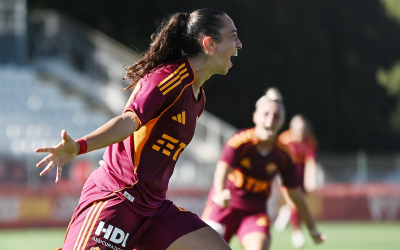External Source
Swiss player Lara Dickenmann has won everything there is to win in women’s football. After her career, she returned to her home country to promote the women’s game as an official. In November, she founded the organization “Fußball kann mehr Schweiz” with fellow campaigners. In an exclusive interview with “The Rise of Women’s Football”, Dickenmann talks about the upcoming UEFA EURO 2025, the problems in Swiss football and her goals with “Fußball kann mehr Schweiz”.
ROWF: Ms. Dickenmann, the start of the UEFA EURO 2025 in Switzerland is in six months’ time, how excited are you?
Lara Dickenmann: I’m delighted that the EURO is taking place in Switzerland next summer. We’ve never had such a big event in women’s football before. The EURO is a huge opportunity for us to change the things we want to change in women’s football.
The spotlight is now on us, on Switzerland, on Swiss women’s football. A big stage to push things in the right direction.
You are one of the players with the most games and goals for Switzerland. Would you like to lace up your boots again yourself?
During my active career, that would of course have been a huge highlight. But now I’m so far away from the performance level that I don’t even think about it. I’m really looking forward to this tournament and I’m looking forward to watching the younger players from the stands.
What can the foreign fans traveling to Switzerland look forward to?
Switzerland is a very beautiful country and the cities involved are very different. Of course we miss the sea, but Switzerland has everything else (laughs).
Lucerne and Thun are two places that are very close to the mountains. Basel, on the other hand, is a bit flatter and different. The distances are also very short, just like in the Netherlands. We will see high-quality football.
The aim of the organisers is to fill the stadiums. Ideally, we can also offer a great atmosphere in and around the stadiums. I know a bit about what’s planned: there will be cool events at the venues.
Ticket sales for the EURO have also got off to a good start. However, if you look at the spectator numbers in the domestic league, apart from a few highlight matches, there is still room for improvement. What still needs to happen in women’s football between now and the summer?
Well, there may be some changes between now and the summer, or only in the playoffs. Many projects have been initiated to ensure that certain things can be built up sustainably beyond the EURO.
With the tournament, we have more opportunities and more resources, including financial ones, to implement such things. The spectator numbers for the national team are already very promising; the record was broken twice recently. Things are already moving in the right direction.

Otherwise, the biggest hurdles are certainly of a structural nature. There are three chambers in the Swiss Football Association: One is the SFL, the highest and second-highest league for men, another is the third-highest league for men and then there is the amateur league, where women’s football is in one chamber.
This means that the representative of the amateur league, who sits on the central board, also represents women’s football. That’s difficult, because we want to professionalize ourselves and the person who represents us on the committees has completely different concerns than we do in women’s football.
So we have to make sure that women’s football is represented at all levels. This is certainly a very central hurdle that should be overcome as soon as possible in order to make a difference. It’s about things that have long existed in other countries: A license system in which clubs receive a guideline from the association on how to work for example. That doesn’t exist at the moment. Every club works a bit on its own, it’s not coordinated.
To ensure that everything is directed in the same direction on the one hand and that certain clubs that are not yet doing anything or only a little achieve certain standards on the other, they have to be guided from above. This structure is missing.
Another example is that we have no limits on foreign players. Of course, this is not conducive to Swiss talents, who then get less playing time or even squad places.
Money was also a big issue in the run-up to the EUROs. Your colleague Sarah Akanji campaigned for an increased budget and collected 16,000 signatures within a short space of time under the name “Rote Karte für den Bundesrat” (“Red card for the Federal Council“) to get the government to increase the budget to CHF 15 million. Are politicians failing to recognize the opportunity presented by women’s football and this tournament?
The budget increase is certainly a strong signal. But in general, I have the feeling that Switzerland hasn’t fully understood the potential of women’s soccer in general, but also of the EUROs. I think more and more people are coming to understand that.
But on the whole, I’m not sure if it’s been understood everywhere. And that’s why we founded “Fußball kann mehr” to draw people’s attention to this critical situation.
And then, as a next step, to show how this situation can be improved. I didn’t live in Switzerland for a long time and when I came back it was a bit disconcerting at first. But that doesn’t mean that something that isn’t there yet can’t be. I also know that many people are motivated to change something. And if I can do my small part, then that’s all the better.
Talking about “Fußball kann mehr”. How did you come to the decision to set up your own organisation?
I am a very solution-oriented person. I’m not someone who complains, I try to think about what can be done, what can be changed.
And the other four people who founded “Fußball kann mehr” with me have had similar experiences. Corine (Turrini Flury) is the mother of a female player, she sees the situation first-hand and has been campaigning for more visibility for women in football as a journalist for years. Sandra (Betschart) and Sarah (Akanji) also played football and then worked in a club.
Patricia (Widmer) comes from the business world and has already initiated many similar projects to promote women in business. So we all had somewhat similar experiences and the same motivation to change something. That’s how we found each other.
“Fußball kann mehr ” made eight demands in the course of its foundation. These include salary transparency and a different structure within the SFV. These are things that won’t happen overnight. What is the timetable behind your demands?
I think that’s very difficult to estimate because we’re at the very beginning and we’re running the organization on a part-time basis. I think some things can perhaps be realized in three to five years, other things need a little more time.
Of course, we are also dependent on other developments. There will be a new president of the Swiss Football Association in the summer. We don’t yet know who will be elected and what the collaboration will look like.
The situation in Switzerland is somewhat comparable to the 2011 World Cup in Germany. The association also thought that the hype would simply continue in the Frauen-Bundesliga after the tournament. That wasn’t the case. How worried are you that the hype that the national team is now experiencing won’t be carried over into everyday life after the summer?
Fear is the wrong word. But when we founded “Fußball kann mehr”, we were aware that the necessary developments would not happen on their own. That there is a need for precisely such organizations, which perhaps also try to drive certain things forward from a neutral position, because the association is unfortunately also reaching its limits, if only in terms of personnel.
So it wasn’t out of fear, but precisely for this reason, that nothing happens on its own, that we founded the organization.
What was the initial feedback you received?
Very positive. I was very pleased and also surprised. Because I had never founded an association like this before and simply didn’t know how it would be received. But we have been getting a lot of requests for membership and support.
I think we have struck a nerve. Because many people have also said that they are just as motivated as we are. And if we need support, we should get in touch.
And I think that’s a good sign. And if, of course, this also becomes known beyond the country’s borders with the support of “Fußball kann mehr” from Germany, that increases our reach enormously and we’re not starting from scratch.
If we were to speak again in a year’s time, what headline would you like to read about women’s football?
For me, the structures that need to change are crucial. That we can make a difference with our ideas, that women’s football is represented at all management levels. That we are involved in strategic planning and budget issues. Women’s football simply has to become an integral part of Swiss football.
Interview: Florian Rümmele
Photo: IMAGO / Eibner



